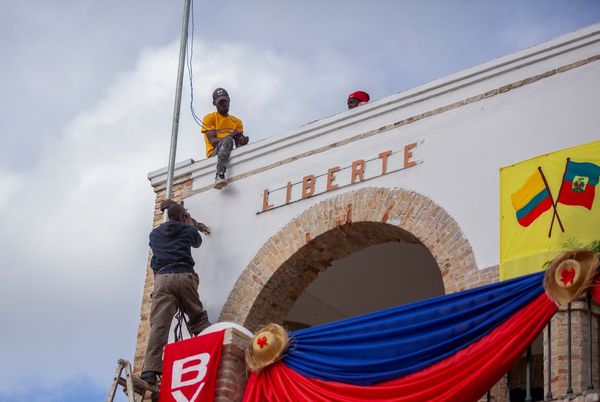
On Thursday 24 February, the first day of Vladimir Putin’s unprovoked, unjustified and increasingly brutal war on Ukraine, a local woman in Henychesk went viral when she was filmed angrily confronting a heavily-armed Russian soldier in the street.
“What the f*** are you doing here?” she asked, berating him by declaring: “You’re occupants, you’re fascists! What the f*** are you doing on our land with all these guns?”
Ignoring his attempts to placate her, she instead brandished a fistful of kernels and said: “Take these seeds and put them in your pockets, so at least sunflowers will grow when you all lie down here.”
With grim pragmatism, she envisioned the flowers sprouting from the uniforms of the Russian dead, taking a bitter solace in the inevitable triumph of nature over human barbarism and in the spirit of her people, as resilient as the earth.
The sunflower (or “soniashnyk”) is Ukraine’s national flower and has been grown on its central and eastern steppes since the middle of the 18th century, cultivated for its seeds, which are eaten as a snack, or crushed into oil, a key ingredient in cooking and an export product of vital importance.
The popularity of sunflower oil in Ukraine has been attributed to the influence of the Orthodox Church, which forbade the use of butter and lard in domestic cooking during Lent but issued no such prohibition against vegetable-based alternatives.
Together, Ukraine and Russia currently produce around 70-80 per cent of the world’s total sunflower oil, with the former sowing 6.5m hectares in 2020-21, according to the Ukrainian Department of Agricultural Development.
Dnipropetrovsk, Kirovohrad, Kharkiv, Zaporizhia, Nikolaev, Luhansk, Odessa and Poltava are its prime growing regions and accounted for 62 per cent of that total.
However, because many of those same areas are now arenas of war, Ukrainian sunflower oil production looks set to be severely disrupted this year, as crushing and bottling plants shutter amid the fighting, Black Sea ports remain closed and roads and railways are given over to prioritising the mass evacuation of refugees to neighbouring states like Poland, Hungary, Slovakia, Romania and Moldova.
Planting season in April and May is also likely to be interrupted by the conflict, hitting next year’s harvest too, with limited access to fertiliser further complicating matters.
The EU typically imports as much as 200,000 tonnes of Ukrainian sunflower oil per month, according to the trade group Fedoil, but several Spanish supermarket chains have already placed per-customer limits on the number of bottles shoppers can buy in anticipation of a coming shortfall, which could in turn have a knock-on effect on the production of snack foods popular in the West.
“There is risk for supply and demand for the next campaign when there are some tensions and military actions in agricultural areas – many roads are blocked, commercial companies are not working, farmers cannot do planting and may reduce average acreage if some areas are occupied,” one trader told S&P Global.
But the sunflower will endure because it always does, the plant itself an emblem of optimism for its hardiness in the ground, its roots making light work of tough clay soils, its stem loaded with nitrogen and its face always tilted towards the sun.
That is why it had been adopted by the people of Ukraine, why it has become a symbol of solidarity with their plight around the world and why sunflowers were planted at the Pervomaysk missile base in 1996 in celebration of the country renouncing the arsenal of nuclear weapons it had inherited after the collapse of the Soviet Union.
Ukraine’s own blue and yellow flag could be said to resemble a clear blue sky looming over a thriving field of crops, promising prosperity and abundance to come, even in the darkest days of famine and want.
The Independent has a proud history of campaigning for the rights of the most vulnerable, and we first ran our Refugees Welcome campaign during the war in Syria in 2015. Now, as we renew our campaign and launch this petition in the wake of the unfolding Ukrainian crisis, we are calling on the government to go further and faster to ensure help is delivered. To find out more about our Refugees Welcome campaign, click here. To sign the petition click here. If you would like to donate then please click here for our GoFundMe page.







